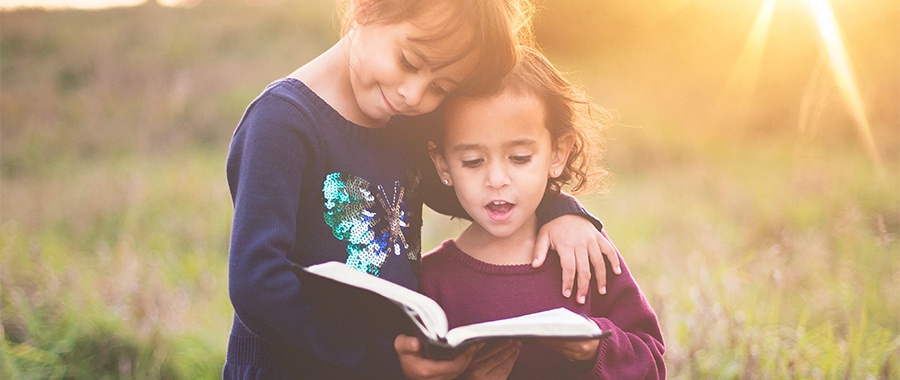The views expressed in our content reflect individual perspectives and do not represent the authoritative views of the Baha'i Faith.
Most parents want to give their children a solid m2oral and spiritual framework for life. What do you do to educate your children spiritually?
If you’re already part of a religious community, you may take your children to regular worship services or children’s classes. If not, you may spend time at home with them, teaching them the inner spiritual beliefs that have served you best in life.
In some way, though, most parents agree that teaching children a set of moral and spiritual values, and familiarizing them with the world’s religions and their principles, will definitely help them grow into more functional, knowledgeable and well-adjusted adults.
In Part 1 of this two-part essay, we looked at five recommendations that summarized how Baha’is and members of other faiths might initiate a sense of curiosity and interest in their children to set them on a path toward spiritual education and awareness. The points examined came originally from an article written by Delores Smyth at the Christian website Crosswalk.com. Here I’ll continue my review of those topic points and their broader application to religious instruction for children—as well as their application to Baha’i life.
1. Make your child feel comfortable at church (or other Faith gathering)
As Delores Smyth pointed out, gone are the days when children dressed formally for worship. This may apply to parents as well. We all know that children are children, and much of their learning is through play. To make church or religious meetings more comfortable for them, we have to loosen up a bit, although many people still ascribe to more formality. For anyone attending a spiritual meeting or worship service, though, cleanliness and clean clothes are still required to show respect and consideration.
The Baha’i writings say:
… in every aspect of life, purity and holiness, cleanliness and refinement, exalt the human condition and further the development of man’s inner reality. Even in the physical realm, cleanliness will conduce to spirituality, as the Holy Writings clearly state. And although bodily cleanliness is a physical thing, it hath, nevertheless, a powerful influence on the life of the spirit. – Abdu’l-Baha, Selections from the Writings of Abdul-Baha, p. 129.
2. Handle criticism with grace
We can’t forget children are children and not adults. They may be loud or act out a meeting. As parents, we quickly learn to bring their favorite toys to help keep them occupied, even if temporarily. Gentle and patient discipline is required. Some adults may be put off by our child’s actions and may criticize us, even in a kind way, for not controlling our kids. Then it is time for divine acquiescence and understanding, since we know children do not always act as we would like. But this kind of experience—when children learn that their good behavior is expected in a holy place—can help the child become well-behaved in other places, too.
The Baha’i teachings say:
A child that is cleanly, agreeable, of good character, well-behaved—even though he be ignorant—is preferable to a child that is rude, unwashed, ill-natured, and yet becoming deeply versed in all the sciences and arts. The reason for this is that the child who conducts himself well, even though he be ignorant, is of benefit to others, while an ill-natured, ill-behaved child is corrupted and harmful to others, even though he be learned. If, however, the child be trained to be both learned and good, the result is light upon light. – Ibid., pp. 135-136.
3. Remember your Biblical responsibility to your children
Ms. Smyth wrote:
Jesus himself loved children so much that he rebuked his disciples for preventing children from approaching him, saying: “Let the little children come to me, and do not hinder them, for the kingdom of heaven belongs to such as these” (Matthew 19:14). Scripture further instructs us to be mindful of our responsibility to our kids: “Start children off on the way they should go, and even when they are old they will not turn from it.” (Proverbs 22:6).
All the prophets of God have made clear that we have a combined responsibility to train our children in the ways of the Creator—and that spiritual education will help our children grow and develop.
The Baha’i teachings say:
Children are the most precious treasure a community can possess, for in them are the promise and guarantee of the future. They bear the seeds of the character of future society which is largely shaped by what the adults constituting the community do or fail to do with respect to children. They are a trust no community can neglect with impunity. An all-embracing love of children, the manner of treating them, the quality of the attention shown them, the spirit of adult behavior toward them—these are all among the vital aspects of the requisite attitude. – The Universal House of Justice, April 2000, To the Baha’is of the World.
4. Strengthen your resolve with the research-backed benefits of church (or other faith gathering) attendance
Whether children go to Baha’i feasts and meetings, synagogue services, Christian services or participate in other religious and spiritual groups, research has established the importance of religion and spiritual training in our children’s lives. In particular, many different studies have shown that exposing children to faith on a regular basis may have the future benefits of:
- Lowered incidents of drug and alcohol use
- Decreased rates of depression and suicide
- A higher rate of hopefulness
- Improved quality of sleep
- An increased chance of living longer
The Bahai writings say:
Should a man wish to adorn himself with the ornaments of the earth, to wear its apparels, or partake of the benefits it can bestow, no harm can befall him, if he alloweth nothing whatever to intervene between him and God, for God hath ordained every good thing, whether created in the heavens or in the earth, for such of His servants as truly believe in Him. Eat ye, O people, of the good things which God hath allowed you, and deprive not yourselves from His wondrous bounties. Render thanks and praise unto Him, and be of them that are truly thankful. – Baha’u’llah, Gleanings from the Writings of Baha’u’llah, p. 276.
5. Encourage your child to join church based groups (or other faith based groups)
When we take our kids, children and youth to church, to Baha’i or any other religious meetings, we introduce them to a community of like-minded people who come together to worship and interact as one. Faces in the seats or pews become more familiar by the week, and friendships begin to blossom within this spiritual community. Most religious organizations offer Sunday school, children’s or youth classes, and outings that can cement friendship and encourage discourse and understanding.
The global Baha’i community, because of its tremendous diversity of race, class, and ethnic and religious backgrounds, can help children form friendships with those they might not encounter in their schools, social groups or day-to-day lives, as well as educating them in the spiritual traditions and values common to all Faiths.
The Baha’i writings say:
The garden which is pleasing to the eye and which makes the heart glad, is the garden in which are growing side by side flowers of every hue, form and perfume, and the joyous contrast of colour is what makes for charm and beauty. So is it with trees. An orchard full of fruit trees is a delight; so is a plantation planted with many species of shrubs. It is just the diversity and variety that constitutes its charm; each flower, each tree, each fruit, beside being beautiful in itself, brings out by contrast the qualities of the others, and shows to advantage the special loveliness of each and all.
Thus should it be among the children of men! The diversity in the human family should be the cause of love and harmony, as it is in music where many different notes blend together in the making of a perfect chord. If you meet those of different race and colour from yourself, do not mistrust them and withdraw yourself into your shell of conventionality, but rather be glad and show them kindness. Think of them as different coloured roses growing in the beautiful garden of humanity, and rejoice to be among them. – Abdu’l-Baha, Paris Talks, pp. 52-53.
One important key for our children’s maturation and development means being involved at many levels in the spiritual life of the community. Parents most of all can facilitate this, along with religious organizations. Baha’is have always laid emphasis on the religious and educational training of children, junior youth and youth, and such programs will continue and expand. If you’d like to participate in the spiritual education of children and young people that takes place in every Baha’i community, just contact the Baha’is in your area—you and your children are welcome!
















Comments
Sign in or create an account
Continue with Googleor